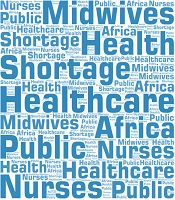Dear Editor,
Africa, the world's second most populous continent, is experiencing a significant shortage of nurses and midwives (1, 2). This lack of essential healthcare professionals presents a major challenge to delivering quality healthcare services throughout the continent (3). As per the United Nations, Africa's population is on a rapid growth trajectory, anticipated to hit 2.5 billion by 2050 (4). Such population expansion exerts enormous strain on the healthcare infrastructure, necessitating a sufficient workforce of skilled healthcare professionals to address the escalating demand for medical services (5). Nevertheless, in the face of this growing necessity, there is an acute shortfall of nurses and midwives in Africa.
Nurses and midwives are crucial elements of Africa's health system, and their contributions to the improvement of healthcare are immensely valuable. A key factor contributing to the shortage of nurses and midwives in Africa is the emigration of skilled healthcare professionals to other regions, predominantly to developed countries (6). Lured by superior working conditions, higher wages, and broader career opportunities, numerous African nurses and midwives opt for employment overseas, resulting in a substantial void in their native countries. Additionally, restricted access to quality education and training programs impedes the development of a sufficient number of nurses and midwives (7).
The lack of well-equipped educational institutions, faculty, and resources, especially in rural areas, hinders aspiring healthcare professionals from obtaining the necessary skills and qualifications. African countries frequently struggle to retain their healthcare workforce owing to a variety of factors, including low salaries, poor infrastructure, limited career advancement opportunities, and difficult working conditions (8, 9). These challenges lead to job dissatisfaction among nurses and midwives, resulting in attrition and further aggravating the shortage.
The scarcity of nurses and midwives in Africa has profound implications for healthcare delivery and the overall health of the population (10). A notable impact is that a limited number of nurses and midwives leads to fewer healthcare professionals available to care for an increasing patient population. Consequently, healthcare facilities become overcrowded, wait times increase, and the quality of care is compromised (11). Skilled midwives play a critical role in ensuring safe childbirth and in reducing maternal and infant mortality rates (12). However, the shortage of midwives in Africa results in insufficient prenatal care, elevated birth complications, and higher mortality rates among mothers and newborns (13). Nurses are often on the front lines of delivering primary healthcare services, especially in underserved rural areas (14). The lack of nurses limits access to vital healthcare services, exacerbates health disparities, and leaves many vulnerable groups without adequate medical care (10).
To tackle the shortage of nurses and midwives in Africa, collective action is needed from governments, healthcare organizations, and international partners. Potential strategies include investing in the expansion and improvement of nursing and midwifery education programs. This could involve establishing more training facilities and enhancing curricula and faculty, thereby increasing the pool of qualified professionals (15). Implementing retention strategies, such as offering competitive salaries, enhancing working conditions, providing career development opportunities, and creating a supportive work environment, can help keep nurses and midwives in their home countries (16, 17). Additionally, focusing on the recruitment and training of healthcare professionals specifically for rural areas can enhance access to healthcare services in underserved regions.
Offering incentives, such as loan forgiveness programs or additional benefits, can entice nurses and midwives to serve in rural communities (18, 19). Fostering partnerships between African countries and international organizations can enable knowledge exchange, capacity enhancement, and the provision of financial resources to mitigate the shortage. These collaborative initiatives can support training programs, scholarships, and exchange opportunities that contribute to the expansion of the nursing and midwifery workforce (20). The deficit of nurses and midwives in Africa presents a significant obstacle to the continent's healthcare system, impacting the quality and availability of healthcare services. By implementing strategies to tackle the root causes of the shortage, including bolstering education and training programs, enhancing retention initiatives, prioritizing rural healthcare, and promoting international cooperation, African countries can work towards alleviating this crisis. Ensuring a sufficient number of skilled nurses and midwives is crucial for improving health outcomes and achieving universal healthcare coverage across the continent.
In conclusion, this article aims to highlight the critical shortage of nurses and midwives in Africa, a situation stemming from various factors such as low wages, inadequate facilities, lack of career advancement opportunities, and challenging working conditions. Enhancing working conditions, offering fair compensation, and providing sufficient facilities are essential steps to mitigate this shortage.
